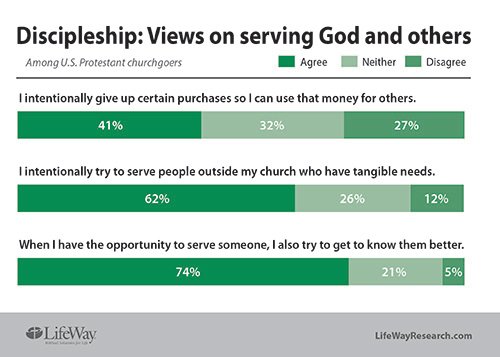By Aaron Earls
NASHVILLE, Tenn. — Jesus said He came not to be served but to serve, and told His disciples, “The greatest among you will be your servant” (Matt. 23:11). Despite Jesus’ admonition, many Protestant churchgoers find it difficult to serve others.
The 2019 Discipleship Pathway Assessment study from Nashville-based LifeWay Research found few Protestant churchgoers say they strongly agree they are personally taking actions that indicate a life of service to God and others.

The study identifies serving God and others as one of eight signposts that consistently show up in the lives of growing Christians.
“Many churchgoers profess faith in Jesus Christ, but are not putting that faith into action,” said Scott McConnell, executive director of LifeWay Research. “Jesus set an example for His followers through both the beliefs He taught and the way He served others.”
Fifteen percent of Protestant churchgoers strongly agree they intentionally give up certain purchases so they can use that money for others. Including those who somewhat agree, 41 percent say they practice that type of intentional generosity.
Younger churchgoers are more likely to take this step of service than older ones. Among 18- to 34-year-olds attending a Protestant church once a month or more, 22 percent strongly agree they give up purchases to use that money for others. The same is true for 18 percent of those age 35-49, 12 percent of 50- to 64-year-olds, and 8 percent of those 65 and older.
Hispanic churchgoers (25 percent) are more likely to strongly agree than African American (17 percent) or white (12 percent) churchgoers.
Those who attend a worship service at least weekly are more likely to strongly agree than those who attend less frequently (16 percent to 11 percent).
Protestant churchgoers are slightly more likely to say they intentionally try to serve people outside of their church who have tangible needs. More than 6 in 10 agree (62 percent), with 25 percent strongly agreeing.
Those 65 and older are the age demographic least likely to strongly agree (19 percent).
Hispanic (38 percent) and African American (29 percent) churchgoers are more likely to strongly agree than white churchgoers (21 percent).
Again, those who attend church services more frequently are more likely to say they serve others in this way, with 26 percent of those who attend at least weekly strongly agreeing compared to 21 percent of those who attend less than four times a month.
“Contrary to a common use of the word among Christians, serving is not confined to having a job to do at church,” said McConnell. “Serving includes showing the love of Christ in tangible ways to our neighbors in need.”
Three-quarters of regular Protestant churchgoers (74 percent) see their acts of service as a way to also get to know others. A full third (33 percent) strongly agree that when they have the opportunity to serve someone, they also try to get to know the person better.
Women (35 percent) are more likely to strongly agree than men (30 percent), while Hispanic churchgoers (45 percent) are the ethnic group most likely to strongly agree.
Regular churchgoers with less than a college degree (36 percent) are more like to strongly agree than those who have a bachelor’s degree or higher (29 percent).
Black Protestants (39 percent) and evangelical Protestants (34 percent) are more likely to strongly agree than mainline Protestants (26 percent).
Those who attend worship services four times a month or more (35 percent) are more likely to strongly agree than those who attend less frequently (28 percent).
“It is easy to get a ‘fix-it’ mentality when serving,” said McConnell. “While there is most definitely a practical aspect to service, there is also a personal element. Without caring to know the person you are helping, a church’s service lacks the love that is at the heart of all Christian service.”
Serving God and others is one of eight signposts measured in the Discipleship Pathway Assessment and addressed in LifeWay’s Bible Studies for Life curriculum. For more information, visit DiscipleshipPathwayAssessment.com.
The online survey of 2,500 Protestant churchgoers was conducted Jan. 14–29, 2019. Respondents were screened to include those who identified as Protestant or non-denominational and attend religious services at least once a month. Quotas and slight weights were used to balance gender, age, region, ethnicity, income and denominational affiliation. The completed sample is 2,500 surveys. The sample provides 95 percent confidence that the sampling error does not exceed plus or minus 2.0 percent. Margins of error are higher in sub-groups.
Aaron Earls is online editor of Facts & Trends and a writer for LifeWay Christian Resources.